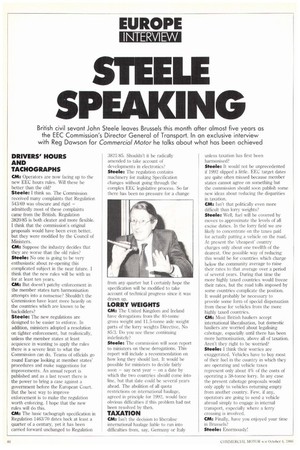EELE SPEAICING
Page 62

If you've noticed an error in this article please click here to report it so we can fix it.
British civil sevant John Steele leaves Brussels this month after almost five years as the EEC Commission's Director General of Transport. In an exclusive interview with Reg Dawson for Commercial Motor he talks about what has been achieved DRIVERS' HOURS AND TACHOGRAPHS CM: Operators are now facing up to the new EEC hours rules. Will these be better than the old?
Steele: I think so. The Commission received many complaints that Regulation 543/69 was obscure and rigid — admittedly most of these complaints came from the British. Regulation 3820/85 is both cleater and more flexible. I think that the commission's original proposals would have been even better, but they were modified by the Council of Ministers.
CM: Suppose the industry decides that they are worse than the old rules? Steele: No one is going to be very enthusiastic about re-opening this complicated subject in the near future. I think that the new rules will be with us for at least ten years.
CM: But doesn't patchy enforcement in the member states turn harmonisation attempts into a nonsense? Shouldn't the Commission have leant more heavily on the countries which are known to be backsliders?
Steele: The new regulations are designed to be easier to enforce. In addition, ministers adopted a resolution on tighter enforcement, but realistically, unless the member states at least acquiesce in wanting to apply the rules there is a severe limit to what the Commission can do. Teams of officials go round Europe looking at member states' procedures and make suggestions for improvements. An annual report is published and as a last resort there is the power to bring a case against a government before the European Court. But the best way to improve enforcement is to make the regulation worth enforcing. I hope that the new rules will do this.
CM: The basic tachograph specification in Regulation 1463/70 dates back at least a quarter of a century, yet it has been carried forward unchanged to Regulation
3821/85. Shouldn't it be radically amended to take account of developments in electronics? Steele: The regulation contains machinery for making Specification changes without going through the complex EEC legislative process. So far there has been no pressure for a change from any quarter but I certainly hope the specification will be modified to take account of technical progress since it was drawn up.
LORRY WEIGHTS
CM: The United Kingdom and Ireland have derogations from the 40-tonne gross weight and 11.5-tonne axle weight parts of the lorry weights Directive, No 85/3. Do you see these continuing indefinitely?
Steele: The commission will soon report to ministers on these derogations. This report will include a recommendation on how long they should last. It would be possible for ministers to decide fairly soon — say next year — on a date by which the two countries should come into line, but that date could be several years ahead. The abolition of all quota restrictions on international haulage, agreed in principle for 1992, would face obvious difficulties if this problem had not been resolved by then.
TAXATION CM: Isn't the decision to liberalise international haulage liable to run into difficulties from, say, Germany or Italy
unless taxation has first been harmonised?
Steele: It would not be unprecedented if 1992 slipped a little. EEC target dates are quite often missed because member states cannot agree on something but the commission should soon publish some new ideas about reducing the disparities in taxation.
CM: Isn't that politically even more difficult than lorry weights?
Steele: Well, fuel will be covered by moves to approximate the levels of all excise duties. In the lorry field we are likely to concentrate on the taxes paid for actually putting a vehicle on the road. At present the 'cheapest' country charges only about one twelfth of the dearest. One possible way of reducing this would be for countries which charge below the community average to raise their rates to that average over a period of several years. During that time the more highly taxed countries would freeze their rates, but the road tolls imposed by some countries complicate the position. It would probably be necessary to provide some form of special dispensation from these for vehicles from the more highly taxed countries.
CM: Most British hauliers accept international liberalisation, but domestic hauliers are worried about legalising cabotage, espacially until there has been more harmonisation, above all of taxation. Aren't they right to be worried? Steele: I think their worries are exaggerated. Vehicles have to buy most of their fuel in the country in which they are operating and vehicle taxes
represent only about 4% of the costs of operating a 38-tonne lorry. In any case the present cabotage proposals would only apply to vehicles returning empty from another country. Few, if any, operators are going to send a vehicle abroad simply to engage in internal transport, especially where a ferry crossing is involved.
CM: Finally, have you enjoyed your time in Brussels?
Steele: Enonriously!








































































































































